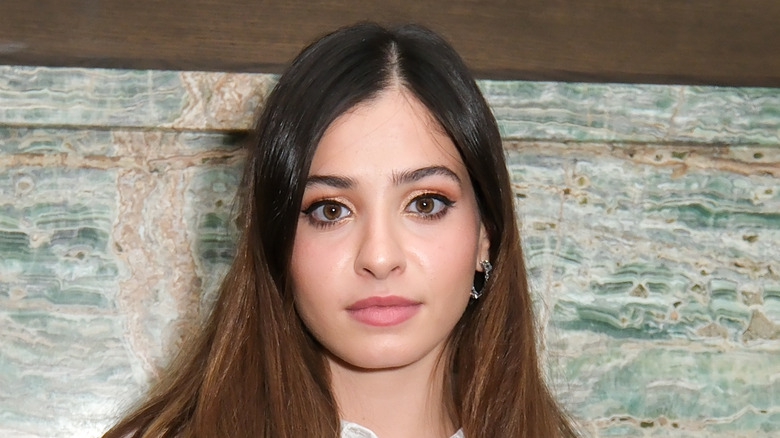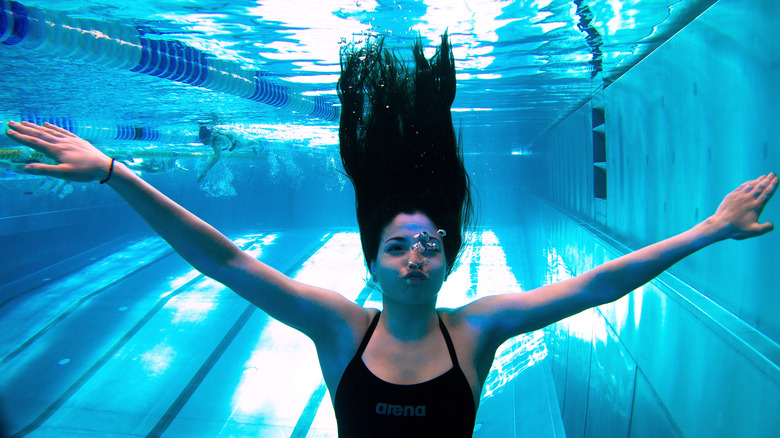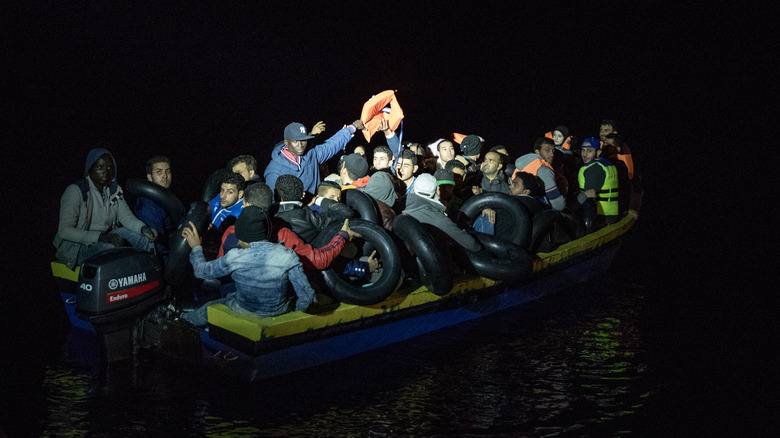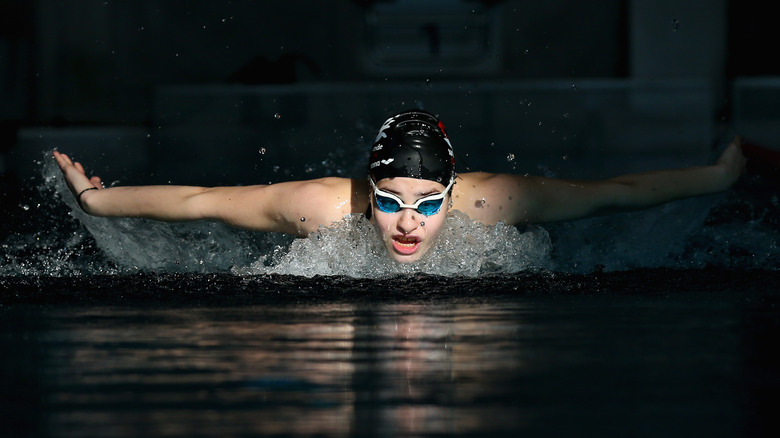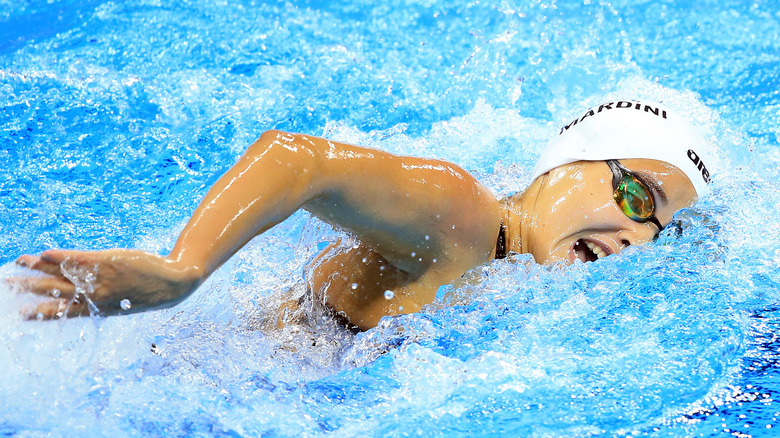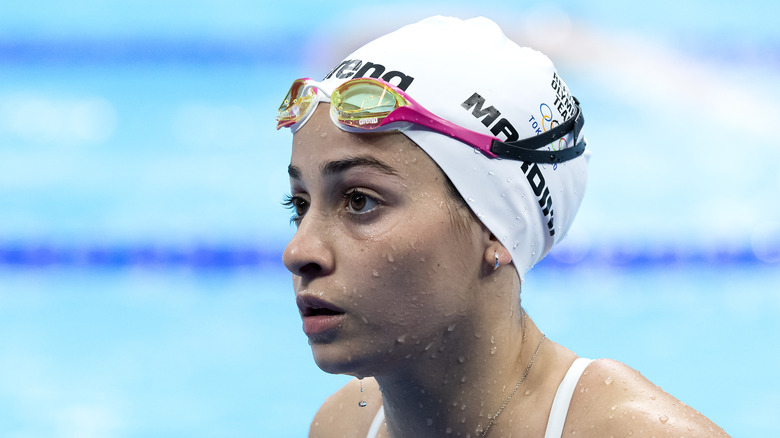The Story Of Yusra Mardini, The Syrian Refugee Who Swam Her Way Into The 2016 Olympics
We may receive a commission on purchases made from links.
Many Olympic athletes have inspiring stories about how they worked hard to overcome obstacles and follow their dreams to compete at the games. But perhaps none of them have a story more incredible than that of Yusra Mardini, a Syrian refugee who went from swimming for her life in the Mediterranean Sea to swimming for gold in two Olympic swimming pools. Mardini competed as part of the Refugee Olympic Team in both the 2016 Rio Olympics and the 2020 Tokyo Olympics (which were actually held in 2021), according to Olympics.com. She was also chosen as the youngest Goodwill Ambassador for the UN refugee agency UNHCR in 2017, according to UNHCR. Now 24, she has published a book about her life called "Butterfly: From Refugee to Olympian — My Story of Rescue, Hope, and Triumph" (via Amazon). A movie inspired by her story called "The Swimmers" will also debut on Netflix on November 23, 2022, according to The Guardian.
Mardini is now planning to use her fame to start a charity foundation for refugees in the U.S. and Germany. "I will always work for refugees because I will always be one — even though I just got my German passport," she told The Guardian.
Diving in
Yusra Mardini was born in 1998, according to Olympics.com. She grew up in the Damascus suburb of Daraya in Syria, where she dreamed of becoming a pilot, according to Vogue. Her father, Ezzat, was a swimming coach who introduced his daughters to the sport by taking them to the local pool. "He just put us in the water," she recalled. Mardini's older sister Sarah was the first member of the family to start swimming competitively, but Mardini soon followed in her strokes. Mardini saw some success and was actually supported by the Syrian Olympic Committee, according to The Guardian. She even represented the country in the 2012 short-course World Championships in Turkey, according to Olympics.com. "I had so many Syrian records, everyone knew who I was," Mardini told The Guardian. "My sister, too. We had had a leadership role since we were young."
Then the war came. First, pro-democracy protests erupted in the country in 2011 as part of the Arab Spring movement. By 2012, the conflict between the government of President Bashar al-Assad and opposition militias had turned into a war, according to Vogue. Fighting in Daraya forced the family to move to a different part of Damascus. One day while Mardini was training in a pool, an unexploded bomb dropped into the water beside her. Eventually, the threat of violence forced Mardini to stop training for two years, according to Vogue. Something had to change.
Swimming for their lives
By 2015, both Yusra Mardini and her sister Sarah felt that their lives were on pause because of the war, according to Vogue and The Guardian. Mardini also wanted to be able to swim again. She insisted to her mother Mervat that she had to let her go. "If I die, I'm going to die in my wetsuit,'" she told her, according to Vogue. Finally, two male relatives agreed to journey with Mardini and Sarah to Europe by way of Turkey. They first flew to Turkey and then waited for four days in the forest for the right time to cross by boat to Greece. The crossing was only a little more than six miles and was supposed to take around 45 minutes, according to Olympics.com. However, their boat was also only supposed to hold six or seven people, but 20 people climbed on.
30 minutes into the crossing, the travelers knew they had a problem. The motor stopped and the boat was on the verge of tipping over, The Guardian reported. Mardini, Sarah, and a third woman were the only people in the 20-person crew who even knew how to swim. So the three of them jumped into the water and spent the next three-and-a-half hours swimming and tugging the other passengers to safety. Mardini said the waves kept filling her eyes with saltwater. "We were pulling and swimming for their lives," she said.
'Sport was our way out'
After safely swimming their boat to shore in Lesbos, Greece, Sarah and Yusra Mardini continued on foot to Berlin, Germany, as AP News reported, a journey that took weeks. They lived in a refugee camp in the city for six months, according to Vogue. But it was here that they learned something that would change especially Mardini's life: An Egyptian translator mentioned a nearby swimming club called Wasserfreunde Spandau 04, according to AP News. The sisters decided to try out. "It was clear these two sisters had trained seriously. Their technique was good," Mardini's former head coach Sven Spannekrebs, who took charge of her training at the time, told Vogue.
Mardini had a lot of work to do to make up for the two years of training she had lost because of the war, but it was work she was willing to put in. Sarah, meanwhile, decided not to continue swimming competitively, in part because of a shoulder injury and "physical and emotional pain," she said, according to The Guardian. However, for both of them finding the Berlin swimming club helped them get settled in their new country in more ways than one. Spannekrebs even helped the sisters get their papers to stay in the country, according to Vogue. "Sport was our way out," Mardini told Olympics.com. "It was kind of what gave us hope to build our new lives."
The Refugee Olympic Team
In March of 2016, the International Olympic Committee (IOC) announced that, for the first time ever, a team of refugees would compete at the 2016 Rio Olympics, according to The Guardian. Previously, athletes who found themselves without a state would not have been able to compete. IOC President Thomas Bach also said the team would help raise awareness of the growing number of people displaced by events like the Syrian Civil War. "This will be a symbol of hope for all the refugees in our world, and will make the world better aware of the magnitude of this crisis," he said in a statement.
Initially, the IOC selected a shortlist of 43 athletes from which to compose the team, and anyone on the team had to qualify according to typical Olympic standards, according to Smithsonian Magazine.
Mardini, once added to the shortlist, worked hard to qualify. "I want to inspire everyone," she told Olympics.com when she was training to qualify. Once at Rio, she competed in both the 100 meter butterfly and the 100 meter freestyle, according to Olympics.com. She did not advance to the semifinals, according to Vogue. However, during the butterfly competition, she did win her heat by more than half a second, as The Guardian reported at the time. "Everything was amazing. It was the only thing I ever wanted was to compete in the Olympics," she said after her victory.
Tokyo and beyond
After competing at Rio, Yusra Mardini experienced yet another dramatic change. "My life basically turned upside down," she told The Guardian. She met both then-U.S. President Barack Obama and the Pope and was chosen as the UNHCR's goodwill ambassador. This gave her the opportunity to champion refugee rights at events like the World Economic Forum in Davos and visit with other refugees in Jordan and Sicily.
But Mardini did not abandon her swimming. She competed with the Refugee Olympic Team once again in the Tokyo 2020 Olympics, according to Olympics.com. This time, she came in third in her heat for the 100 meter butterfly and did not advance to the semifinals. Now, her upcoming movie and her planned foundation to help refugees find opportunities in sports and education will allow her to materially help people who find themselves between countries. "I tell my story because I want people to understand that sport saved my life," she told Olympics.com.
